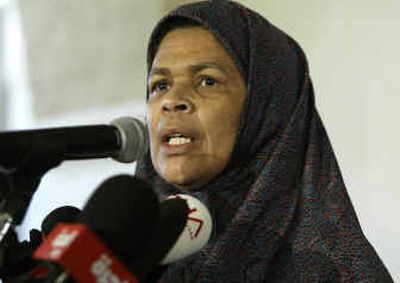Female leads men in Muslim prayers

NEW YORK – With four words, “Praise be to Allah,” Amina Wadud struck a blow Friday for Muslim women, breaking a centuries-old taboo against women leading men in prayer.
Wadud, a professor of Islamic studies at Virginia Commonwealth University, led about 80 people in prayer at Synod House of the Cathedral of St. John the Divine in Harlem.
Men and women bowed toward Mecca as Wadud led them in traditional Friday worship.
The two-hour service was part of the “Progressive Muslim” movement in the United States, which seeks to give women equality with men. The movement has grown in part because children of immigrants view some of the faith’s views as old-fashioned.
Several mosques turned down the opportunity to be host to Friday’s service; a bomb threat then forced organizers to move the event from a Soho gallery to the cathedral, where police officers screened participants for weapons. Wadud was escorted by two bodyguards, and police patrolled outside Synod House, some carrying submachine guns.
“The issue of gender equality is a very important one in Islam,” Wadud said during a news conference before the service, “and Muslims have unfortunately used highly restrictive interpretations of history to move backward. With this prayer service we are moving forward. This single act is symbolic of the possibilities within Islam.”
During her prayer and sermon, Wadud referred to God as both male and female. She said she based that on the Koran, which says that Allah is not like humans. The Koran refers to both men and women in describing moral behavior.
“Allah cannot be limited to being either a he or a she,” Wadud said, “because that will make him like us.”
She said Islam initially treated men and women equally but men had rewritten the rules “to justify the imprisonment of women to only be complementary to men as sexual partners.”
As the service began Friday, a woman in a head covering wiped tears from her face. Others hugged daughters tightly.
Asra Q. Nomani, an author and former Wall Street Journal reporter, said she had organized the service so that women would have “the right to enter a mosque, to enter through the front door, and to be greeted as my brother greeted me earlier.”
Some critics have accused Nomani of using the event to publicize her new book, “Standing Alone in Mecca: An American Woman’s Struggle for the Soul of Islam.” A press release for the book was handed out with a release for the event, but Nomani said she was there out of deep conviction.
“Look around you,” she said. “Everybody here is present because of heart.”
Zarina Nares, 9, attended with her sisters and her mother, Ameena Meer. She said she did not like the idea of women being forbidden from leading men and women in prayer.
“I kind of think it’s unfair because I think everyone has a voice,” she said.
Three men tried to interrupt the service before it started. One of them shouted in the lobby as police forced them to leave.